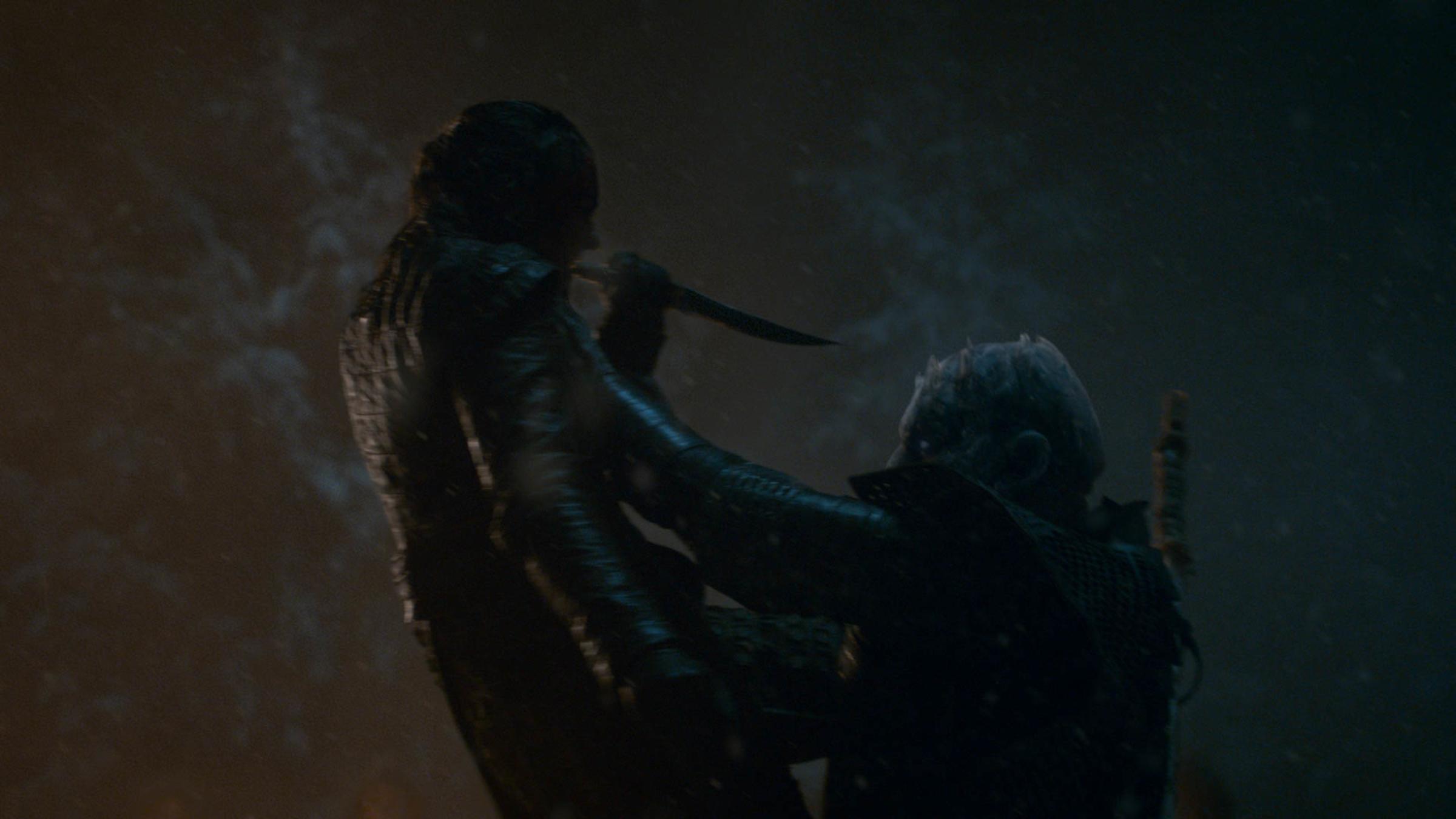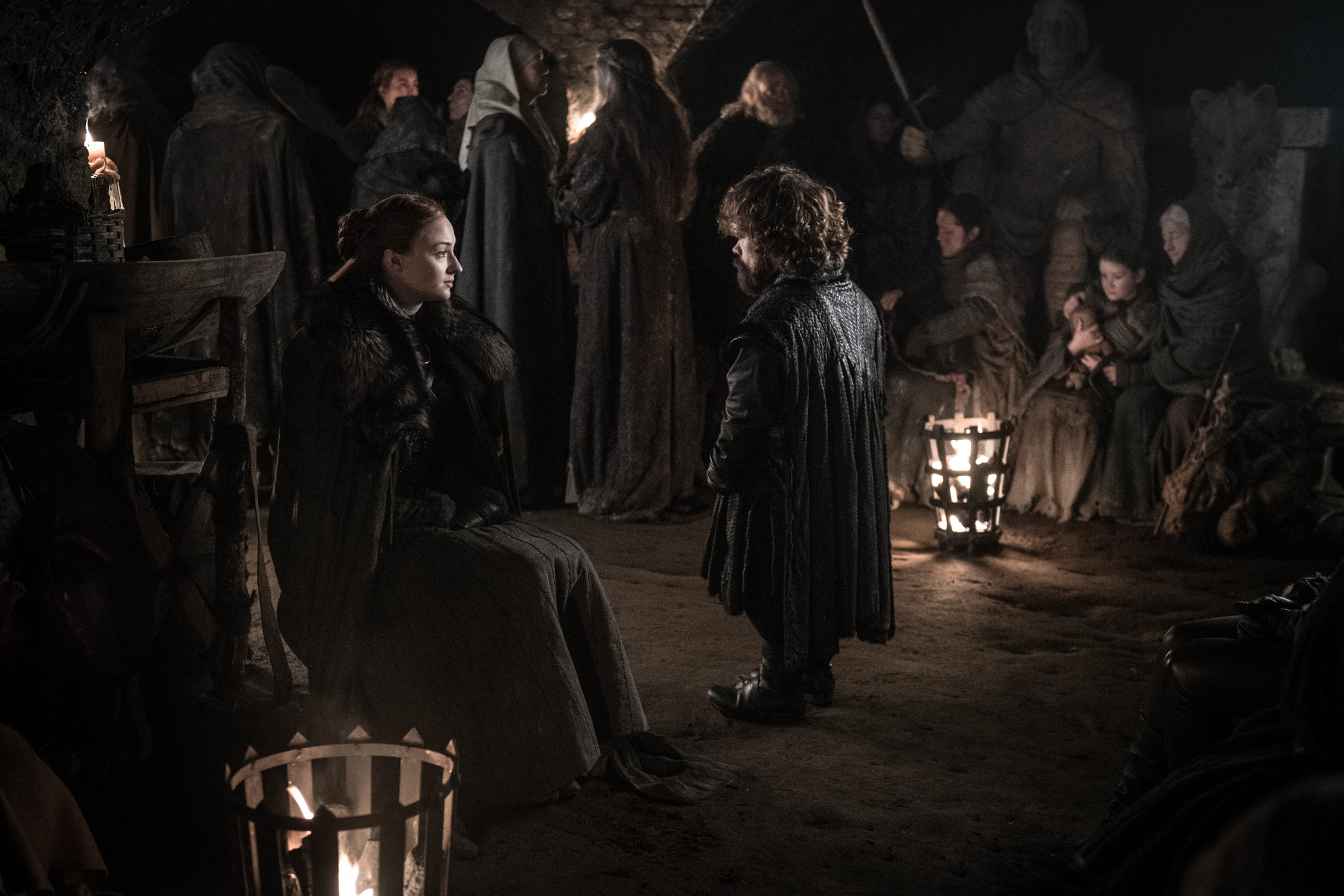This was supposed to be the big one. Sure, Game of Thrones squandered the opening third of its final season on two episodes that felt, respectively, like the first day of school and the last night of camp. (For what it’s worth, I did find the layered scene in episode two where Brienne vouched for Jaime with Daenerys and Sansa gratifying.) But the show had to get it together for the Battle of Winterfell—a conflict of unprecedented magnitude that would finally settle the question of whether Dany, the Starks and their ever-growing army of allies could survive the Night King’s onslaught.
In one sense, “The Long Night” (as the episode was titled) succeeded: It looked gorgeous. Miguel Sapochnik, the director behind the outstanding melees in season 5’s “Hardhome” and season 6’s “Battle of the Bastards,” covered each scene in washes of black night, blue ice and orange fire. It was a literal choice for the capstone battle of the Song of Ice and Fire saga, to be sure, but one that delivered some of the show’s most breathtaking images—from that moment when Dothraki swords lit up around the perimeter of Winterfell to the one, almost immediately after, when their blaze was suddenly, ominously extinguished. (R.I.P. Dothraki civilization.) Even the dragon-riding looked less silly this week. If it was, at times, hard to see what was happening, at least Sapochnik captured how disorienting and demoralizing it must be to fight a massive, fearless, anonymous enemy whose leader has the power to mobilize your dead just by raising his arms.
Yet for a feature-length action sequence that Game of Thrones has been foreshadowing since the series premiere, it felt strangely anticlimactic. In some respects, the show had written itself into a corner: Unlike the exhilarating Battle of the Bastards, this necessary conflict offered zero interpersonal showdowns that viewers could get invested in emotionally. (The Night King may be terrifying, but he’s not exactly a complex character.) Before the episode even aired, the Battle of Winterfell’s mere placement in the first half of the season had essentially confirmed that the dead were going down. But that foregone conclusion would’ve been forgivable if “The Long Night” offered any major surprises in terms of who lived, who perished, who redeemed themselves and who—most notably Arya—found glory.

There were, of course, a handful of low-drama deaths. No offense to Dolorous Edd, Beric Dondarrion or the delightful Lyanna, but I can’t imagine anyone expected they’d figure prominently in the power struggle that will presumably dominate the next three episodes. Theon had too many moral strikes against him to live much longer—though it was pretty perfect that he died charging recklessly at the Night King like he could still somehow become the hero of this story. Jorah all but signed his own death warrant when he betrayed Daenerys; it also seemed inevitable that he’d prove his ultimate loyalty while meeting his end. All of us who were certain, in early seasons, that Melisandre was pure villain owe her an apology. And as for the Night King, easily the episode’s most crucial casualty, it’s not like there was a way to save Winterfell without killing him.
Frankly, the characters fans actually cared about got off too easy. Jon, Dany, Tyrion, Jaime, Brienne, Sam, Tormund, every single remaining Stark, Davos, Gendry, The Hound, two out of three dragons—they’re all still in the game. Hell, even Grey Worm lives to flirt another day. For a battle that apparently took a major chunk out of the population of Westeros, its emotional impact was practically nil.

Maybe I’m abnormally callous when it comes to Game of Thrones, but with just a few episodes left in the series, I think more characters should have died. Someone who deserved to live a long, satisfying life should’ve been gone in the blink of an ice-blue eye. Someone viewers loved should have bit it with a slew of wights gnawing on their entrails. Someone should’ve been knocked out of the running for the Iron Throne. Season 8 has now essentially spent three of its last episodes on fan service, from Jon and Dany’s goofy dragon ride to Brienne’s well-deserved but unrealistically progressive knighting to Arya shattering the Night King while her brother (but actually cousin) tussled with an ice dragon.
That isn’t just lazy, predictable writing; it’s a betrayal of what made George R.R. Martin’s epic so great. In season 1, Ned Stark’s execution implied we were in for a different kind of fantasy narrative—one where genre conventions were always being upended, where the good guys didn’t always win and where part of the fun of watching was in realizing that any of your faves could die at any moment. Game of Thrones still has three weeks to end on a thrilling note. It’s just getting harder and harder, with each new episode, to imagine how that finale could possibly deliver on eight seasons’ worth of anticipation.
More Must-Reads from TIME
- Why Trump’s Message Worked on Latino Men
- What Trump’s Win Could Mean for Housing
- The 100 Must-Read Books of 2024
- Sleep Doctors Share the 1 Tip That’s Changed Their Lives
- Column: Let’s Bring Back Romance
- What It’s Like to Have Long COVID As a Kid
- FX’s Say Nothing Is the Must-Watch Political Thriller of 2024
- Merle Bombardieri Is Helping People Make the Baby Decision
Contact us at letters@time.com